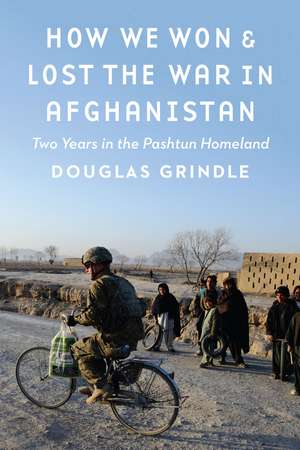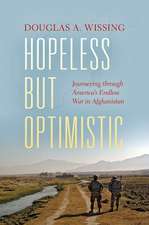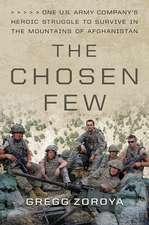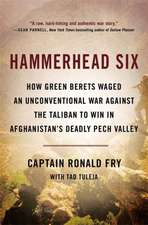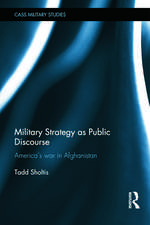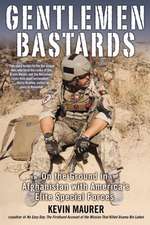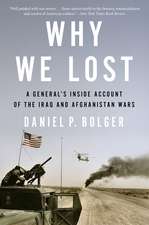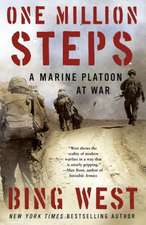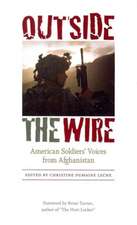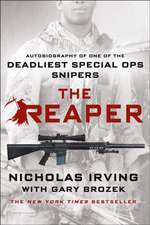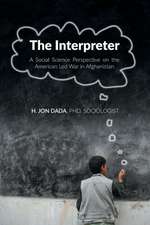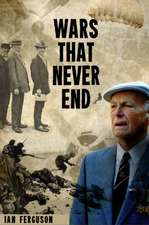How We Won and Lost the War in Afghanistan: Two Years in the Pashtun Homeland
Autor Douglas Grindleen Limba Engleză Hardback – noi 2017
By placing the reader at the heart of the American counterinsurgency effort, Grindle reveals little-known incidents, including the failure of expensive aid programs to target local needs, the slow throttling of local government as official funds failed to reach the districts, and the United States’ inexplicable failure to empower the Afghan local officials even after they succeeded in bringing the people onto their side. Grindle presents the side of the hard-working Afghans who won the war and expresses what they really thought of the U.S. military and its decisions. Written by a former field officer for the U.S. Agency for International Development, this story of dashed hopes and missed opportunities details how America’s desire to leave the war behind ultimately overshadowed its desire to sustain victory.
Preț: 168.07 lei
Nou
Puncte Express: 252
Preț estimativ în valută:
32.16€ • 33.46$ • 26.55£
32.16€ • 33.46$ • 26.55£
Carte disponibilă
Livrare economică 24 martie-07 aprilie
Preluare comenzi: 021 569.72.76
Specificații
ISBN-13: 9781612349541
ISBN-10: 1612349544
Pagini: 288
Ilustrații: 19 photographs, 2 maps, index
Dimensiuni: 152 x 229 x 25 mm
Greutate: 0.57 kg
Editura: Potomac Books Inc
Colecția Potomac Books
Locul publicării:United States
ISBN-10: 1612349544
Pagini: 288
Ilustrații: 19 photographs, 2 maps, index
Dimensiuni: 152 x 229 x 25 mm
Greutate: 0.57 kg
Editura: Potomac Books Inc
Colecția Potomac Books
Locul publicării:United States
Notă biografică
Douglas Grindle is an analyst and former freelance journalist whose work has appeared in scores of media outlets, including CSPAN, Fox News Radio, and numerous television stations across the country. He spent six years as a war correspondent in Afghanistan and Iraq, two years as a field researcher for the Department of Defense in Afghanistan, two years as a district advisor with USAID, and, most recently, five months in Kabul as a civilian researcher for the U.S. Army.
Cuprins
List of Illustrations
Acknowledgments
Prologue
Introduction
List of Abbreviations
Part One. Into Afghanistan
1. The Train-Up
2. KAF World
Part Two. Into Dand
3. Settling In
4. Ousting the Taliban
5. Nazak’s Grand Bargain
6. Priming the Economy
7. Waiting to Work
8. Kick-Starting the Staff
9. Outpost Life
10. Security Holds
11. Women’s Work
Part Three. Dand in the Balance
12. Stealing from Women
13. Still Starved of Money
14. Corruption of Many Kinds
15. Holding Back the Taliban
16. The Economy Misses
17. Solutions Made in Washington
18. Dand in the Balance
Part Four. On to Maiwand
19. Two Districts
20. Security Failing in Maiwand
21. Drugs, Not Jobs
Epilogue
Notes
Bibliography
Index
Acknowledgments
Prologue
Introduction
List of Abbreviations
Part One. Into Afghanistan
1. The Train-Up
2. KAF World
Part Two. Into Dand
3. Settling In
4. Ousting the Taliban
5. Nazak’s Grand Bargain
6. Priming the Economy
7. Waiting to Work
8. Kick-Starting the Staff
9. Outpost Life
10. Security Holds
11. Women’s Work
Part Three. Dand in the Balance
12. Stealing from Women
13. Still Starved of Money
14. Corruption of Many Kinds
15. Holding Back the Taliban
16. The Economy Misses
17. Solutions Made in Washington
18. Dand in the Balance
Part Four. On to Maiwand
19. Two Districts
20. Security Failing in Maiwand
21. Drugs, Not Jobs
Epilogue
Notes
Bibliography
Index
Recenzii
"A well-told story and a must-read for those who want to understand the obstacles to success in Afghanistan."—Publishers Weekly
"In this personal account, analyst Douglas Grindle writes on spending two years in southern Afghanistan working for the United States Agency for International Development. . . . Grindle's book embodies Afghans' perspective to highlight the US's failure in adequately providing and directing aid, and its failure to empower local officials to build and maintain permanent institutions. Drawing from experiences on the ground, Grindle's book is illustrative of the realities of Afghanistan and the state the US has left it in."—Anijishnu Das, Middle East Journal
“The best book yet to explain what the civilians in Afghanistan at the district level actually were doing and trying to do. Highly readable: it contains much from which we could learn if we have the will to do so.”—Ambassador Ronald E. Neumann, author of The Other War: Winning and Losing in Afghanistan
“Douglas Grindle has gone more than the extra mile. Crisscrossing the battlefields of Iraq and Afghanistan, we sometimes met in the most unlikely places, ranging from Mosul to our last encounter in a Stone Age village in the Afghan hinterlands. Grindle truly has been there, done that, and writes from rare experience.”—Michael Yon, former Green Beret, war correspondent, and author of Moment of Truth in Iraq and Danger Close
“Doug Grindle’s insightful understanding of the Afghan people and their trials and tribulation make this account a must-read. There is much to learn from those who would dare to enter this world. This lively account of the war in the villages is highly recommended and will not disappoint.”—Sam Striker, author of The Humanity of Warfare: Social Science Capabilities and the Evolution of Armed Conflict
“This is the story of a man who couldn’t look away. Douglas Grindle first traveled to Afghanistan as a reporter to cover the war; then he returned as an aid worker to help build the peace. For years he lived under its spell, enthralled by its mysteries, vigilant of its dangers, but ultimately uncertain if he was able to do any good. Much like the United States and its allies.”—Kevin Sites, associate professor of practice at the Journalism and Media Studies Centre at the University of Hong Kong, and author of Swimming with Warlords: A Dozen-Year Journey across the Afghan War
